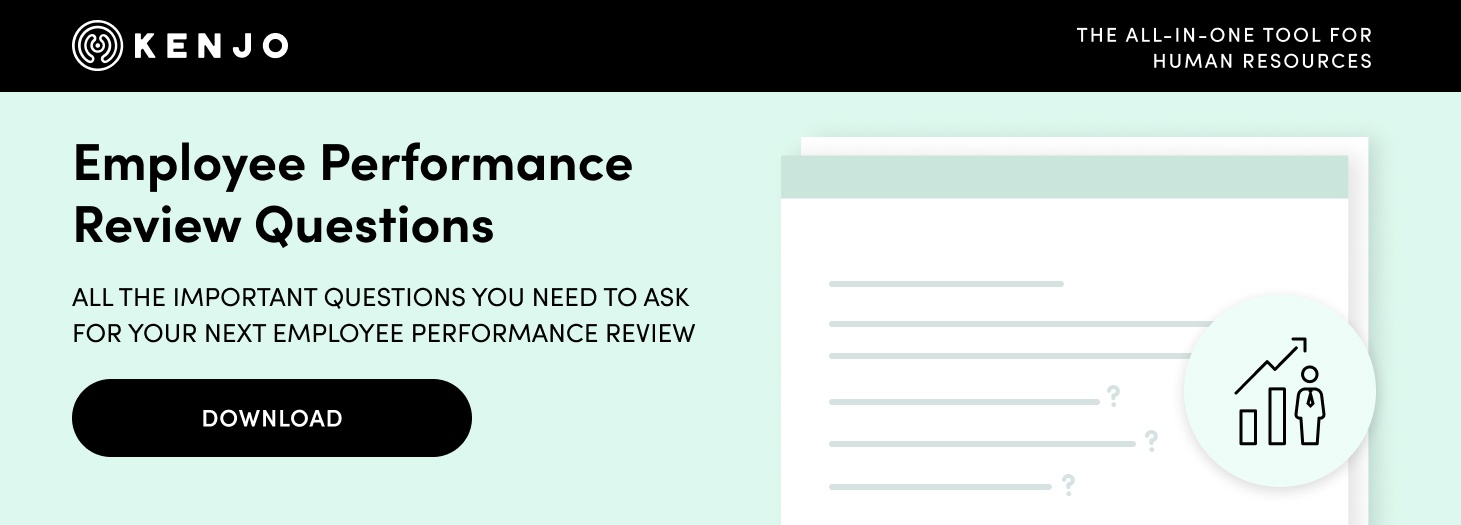Which performance appraisal questions should you ask?

Evaluating the performance of your workforce is as important as it is delicate. Employees often have misgivings about them, which is why it’s vital to take the right approach. In addition to running an internal communication campaign, create a questionnaire with specific performance appraisal questions that are adapted to each role. This will make employees feel more comfortable and willing to cooperate.
Things to bear in mind beforehand running a performance review
How to conduct a performance review? The process involves a series of important steps be followed if you want you get the information the company is looking for. The first, which will shape all the others, is always the same: setting objectives.
It’s important that each employee - together with the organisation - sets themself a set of six-monthly objectives that will guide them towards improvement and fulfilling them.
When appraisal day arrives, these objectives will have given us a framework for measuring and evaluating each employee’s work. The objectives will also help us to create a pre-appraisal questionnaire from which we can extract qualitative information as well as see things from the worker’s point of view.
Creating an ecosystem of bidirectional communication is essential during the performance review. The employee will feel more comfortable and valued if given the chance to provide feedback about their own performance. Another point to keep in mind is that you should avoid making the most common errors in performance appraisal.
This last point, along with constructive criticism, is fundamental in cases where the appraisal has a negative result. Balancing the dialogue with constructive criticism, advice on how to improve where needed and recognising achievements is crucial. If not, you may see a drop in the employee’s productivity, their motivation, and they may even leave the company.
We must always bear in mind that performance reviews are intended to spot areas for improvement and emphasise each employee’s good practices or strengths.
Questions to ask in performance appraisal
One of the main errors in a performance review is not having prepared a questions with which to guide the meeting. We look at the most important ones below:
Before we begin, is there anything you’d like to say?
This is a way of opening the session as it gives the employee a chance to express their opinion or say something that may affect the appraisal process.
In your opinion, what is the aim of this appraisal?:
This question gives us an insight into the employee’s mentality or attitude towards the evaluation. Some will feel that they are being subjected to a test and others, on the other hand, will see it as an opportunity to express their opinion.
What has been your biggest achievement in the last few months?
Start on a positive note. Give them the opportunity to talk about themself, to feel proud of their work and explain the value they offer to the company. This will help them feel comfortable and relaxed.
What do you feel is your main challenge for the year ahead?
The employee’s answer should show awareness of their environment and the challenges that lay ahead. At the end of each year every employee should be able to plan and have a clear idea of which direction their professional development should take. It will also give us an idea about how we can help them meet their expectations.
Do you feel that yout personal objectives are aligned with those of the company?
There are two reasons for this question. Firstly, to check whether or not the employee feels connected to what’s happening in the company. And secondly, it will help us to understand of they are growing as an individual, or not.
If you could change one aspect of your current role, what would it be and how would you implement this change?
The person doing the job is best source of information about the potential deficiencies of this role. This question offers managers the opportunity to see it from their point of view, identify problems and make improvements.
If you could change something at a higher level, what would it be and how would you implement it?
Middle managers are used to dealing with day-to-day business and are not aware of the ins and outs of senior management. On one hand, this question could encourage creative ideas, and on the other, make the employee understand how difficult it can sometimes be to implement certain changes.
Which role would you like to take up next in the company?
By asking about their professional objectives and the evolution of their career, we’ll obtain information that will help them reach their objectives. This information is useful, for example, in setting their objectives for the year ahead and even to create a training plan.
In which areas do you feel need to improve?
The aim of this question is to see whether they are aware of their own limitations and to assess their degree of self-awareness as professionals.
Which of your abilities make you more efficient and effective at your job?
This question will help both the employee and their manager to understand whether they are a good fit for their role.
Do you think yout team works well together?
the employee undoubtedly works as part of a team and alongside other professionals. Well-being is fundamental to a company’s success which is why information about internal dynamics and possible improvements is always useful.
What are the obstacles that prevent you from achieving your goals?
Most employees won’t criticise the company unless they are asked. This is the question.
Do you have all the necessary tools and resources to do your job?
This is an important question as it gives the employee an opportunity to reveal the technical limitations they face on a daily basis and how additional tools or resources could help them improve their productivity.
If you were responsible for the team, what would you do differently?:
This question attempts to spot work or team-related management issues which the employee may disagree with and help us find ways of resolving them. It can also generate interesting ideas that could be applied internally.
How do you prefer to receive feedback? Have you received enough this year?
When it comes to feedback, some people prefer to receive it behind closed doors and others don’t mind if the whole team is present. Understanding each person’s preferences is important so that the feedback is taken positively. In terms of the second question, it’s interesting to know whether or not the employee feels they are getting enough feedback about their work.
What changes would you like to see in your working environment?
Employees usually have an idea of how their office should be or about things that could be included in the company culture.
Do you have any questions?
It’s important to give the employee another chance to ask any questions they may have. Once again, this will instil trust and make them feel valued.
Performance review software is extremely useful to help you design the questionnaire and make a note of the answers obtained. They also offer pre-designed templates that enable you to do an appropriate follow up and store all the information gathered for future reference.
Examples of questions to ask in a performance review
Choose your words wisely, as the Harvard Business Review points out. Performance review questions should be specific, short and to the point. It’s essential to follow guidelines to achieve effective communication.
In addition, it’s essential to use constructive criticism when pointing out areas of improvement without demotivating the employee. At the same time, the key is to offer specific solutions to these problems or ideas on how they can progress.
Dick Grote, author of the book "How to be good at performance appraisals" emphasises the importance of not averting problems nor sweetening negative feedback. ”As time goes on, that person is not going to get a promotion and not going to get a raise. You’re not doing them any favours by avoiding their deficiencies,” he explains.
Here is a list of phrases you can use in your next performance appraisal. They can be used both in the final written evaluation or during the meeting itself:
- Met or exceeded original expectations by “X” or by a margin of “X%”.
- Achieved optimum levels of performance in areas such as...
- Improved their general productivity levels by “X%.”
- Showed proactivity in several areas, both within and outside of their project.
- Communicates their point of view and expectations effectively.
- Showed an interest in hearing about, and tackling the problems shared by their colleagues.
- Offered to provide ongoing training in “X” area.
- Understands the needs of their colleagues and offers to help out in...
- Follows and responds to company culture and inspires their colleagues.
- Developed successful strategies in relation to administrative tasks such as “X” that produced good results.
- Always tries to innovate, even in challenging situations.
- Proposes new ideas and techniques for improving team collaboration.
- Punctual and fulfils their working hours.
- Shows consistent improvement and overall growth.
- Develops good client relationships and engages with them.
- Capable of taking on a role with more responsibility.
Further questions to ask during performance appraisals
If you’d like to create a more extensive questionnaire, here are some further questions:
- What do you think are the main drivers of the company’s success?
- What motivates you to do your job?
- What could the company do to make your job more enjoyable?
- In which areas would you like to grow professionally?
- Which of your strengths or abilities do you feel are currently being underused?
- Which projects do you feel would benefit more from your input?
- Do you agree with the company culture? What would you improve?

